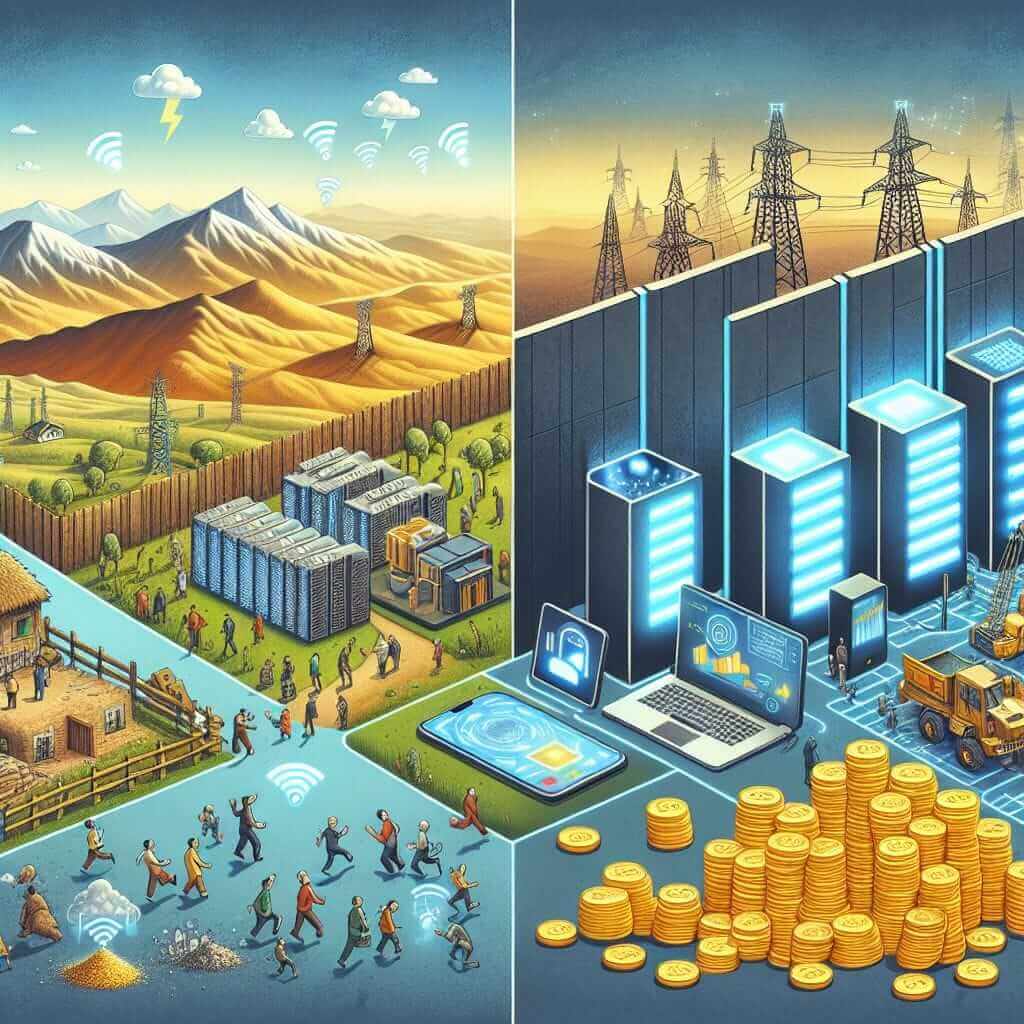The IELTS Reading Test is a critical component for evaluating a candidate’s reading comprehension skills. Topics range from science to culture, and as global economies digitalize, questions about the challenges of transitioning to a digital economy have become increasingly relevant. The evergreen nature of this subject, driven by continuous technological advancements and policy changes, suggests that it may appear frequently in future IELTS exams.
Reading Passage with Questions
Reading Passage
Transitioning to a digital economy is seen as a crucial step for any nation aspiring to secure a competitive edge in the global market. However, this transition is fraught with challenges that must be navigated carefully.
1. Digital Infrastructure:
The backbone of any digital economy is its infrastructure. This includes broadband networks, data centers, and cloud services. In many developing countries, inadequate infrastructure hampers growth and limits access to digital services. Governments and businesses must invest significantly to build robust, scalable, and secure digital infrastructure that supports high-speed internet and data transfer.

2. Cybersecurity Concerns:
As more data is stored and transferred online, the risk of cyber-attacks increases. Cybersecurity is a major concern, with breaches leading to significant financial losses, data theft, and loss of consumer trust. Nations must develop comprehensive cybersecurity strategies to protect data integrity and privacy.
3. Workforce and Skill Development:
The workforce must possess the necessary skills to thrive in a digital economy. This requires substantial investment in education and training programs to bridge the digital skill gap. Countries that fail to equip their workforce with digital skills may find themselves lagging.
4. Regulatory and Ethical Issues:
Navigating the regulatory landscape is another challenge. Regulations must evolve to address data governance, digital taxation, and intellectual property rights in the digital age. Ethical issues, such as data privacy and the digital divide, must also be considered to ensure that digital transformation benefits society as a whole.
5. Digital Literacy and Inclusiveness:
Digital literacy is fundamental for the adoption of digital services. Populations in remote areas and underprivileged groups often lack access to digital education, exacerbating inequality. Initiatives to improve digital literacy and ensure inclusiveness are vital for a successful digital transition.
6. Economic and Political Stability:
Economic policies and political stability play crucial roles in facilitating or hindering the transition. Countries with unstable economies or political environments face additional challenges in implementing long-term digital strategies.
Questions
Multiple Choice
-
Why is digital infrastructure a fundamental challenge in transitioning to a digital economy?
- A) It is costly to build.
- B) Developing countries have sufficient infrastructure.
- C) It does not impact digital services.
- D) Developing countries have inadequate infrastructure.
-
Which of the following is a major concern related to an increase in online data?
- A) Slower internet speeds
- B) Limited data storage
- C) Cyber-attacks
- D) Higher costs
True/False/Not Given
- Countries that do not address the digital skill gap may succeed in the global market.
- Regulatory frameworks must adapt to new digital challenges.
- Digital literacy is not a significant factor in digital economy adoption.
Matching Information
Match each of the challenges with the corresponding solution.
-
Digital Infrastructure
-
Cybersecurity Concerns
-
Workforce and Skill Development
- A) Invest in education and training programs.
- B) Develop comprehensive cybersecurity strategies.
- C) Build robust and scalable broadband networks.
Answer Key with Explanations
-
D) Developing countries have inadequate infrastructure.
- Explanation: The passage highlights the inadequacy of digital infrastructure in developing countries as a major hindrance.
-
C) Cyber-attacks
- Explanation: The text states that as data is stored and transferred online, the risk of cyber-attacks increases.
-
False
- Explanation: The text clearly states that countries failing to equip their workforce with digital skills may lag.
-
True
- Explanation: The passage mentions the need for regulations to evolve to address various issues in digital transformation.
-
Not Given
- Explanation: While digital literacy’s importance is mentioned, the text does not explicitly state that it is not a significant factor.
-
C) Build robust and scalable broadband networks.
-
B) Develop comprehensive cybersecurity strategies.
-
A) Invest in education and training programs.
Common Mistakes
- Misinterpreting Questions: Ensure you carefully read and understand each question before answering.
- Time Management: Practice managing your time efficiently to avoid rushing through the last part of the test.
- Ignoring Keywords: Pay attention to keywords in the questions and in the text to find answers accurately.
Vocabulary
- Infrastructure (noun) /ˈɪnfrəˌstrʌkʧər/: The basic physical and organizational structures needed for the operation of a society or enterprise.
- Cybersecurity (noun) /ˈsaɪbərsɪˌkjʊrɪti/: Protective measures against cyber-crimes such as hacking and data breaches.
- Inclusiveness (noun) /ɪnˈkluːsɪvnəs/: The practice or policy of including people who might otherwise be excluded or marginalized.
Grammar Point
Conditional Sentences (Type 1)
- Structure: If + present simple, future simple
- Example: If countries invest in digital infrastructure, they will thrive in a digital economy.
- Usage: Used to talk about real and possible situations in the future.
Tips for a High Reading Score
- Skim and Scan: Develop the ability to skim texts for general ideas and scan for specific information.
- Practice Regularly: Regular practice using various IELTS reading materials will boost your confidence and speed.
- Understand the Question Types: Familiarize yourself with different types of questions to tackle them effectively.